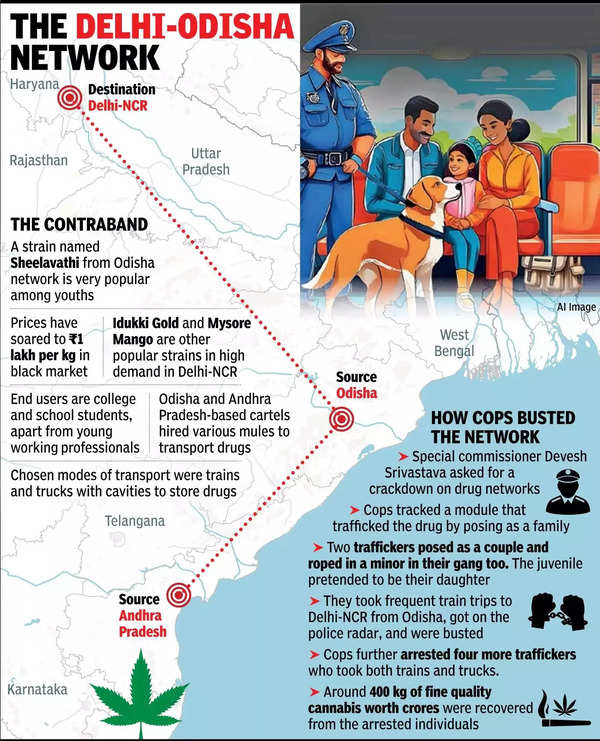
NEW DELHI: At first glance, they appeared to be a quintessential family, enthusiastically embarking on a vacation, their affable smiles and nonchalant laughter seamlessly blending into the bustling railway station throng. During their sojourn to their destination, they would frequently open their tiffins and share food with fellow passengers, projecting an image of ordinary travellers.
Their luggage, comprising trolley bags and backpacks, seemed to hold the promise of a tranquil getaway.However, beneath the veneer of normalcy, a sinister truth lurked. Anita, aka Mano, 45, Aman Rana, 26, and a 16-year-old girl were not who they seemed to be. Their innocuous demeanour allegedly concealed their ruse of drug trafficking.

Their behaviour and communal eating habits were meticulously orchestrated to deflect suspicion, enabling them to transport their illicit cargo undetected.
However, their frequent travel plans between Odisha and Delhi were thwarted as Delhi Police‘s crime branch cracked down on the network. Police not only apprehended them but also four other members of the network with a staggering 400kg of drugs in successive operations.
The modules were busted as part of an operation codenamed Kavach, spearheaded by special commissioner of police Devesh Srivastava. A team comprising additional CP Sanjay Bhatia and DCP Satish Kumar assiduously studied the modus operandi of the traffickers, the routes they traversed, and the source supplying them with the contraband. The end users of this supply chain were college and school students.
The first breakthrough came after crime branch received intelligence on the travel plans of the suspect family they had been tracking. A tip-off led ACP Narender Beniwal and inspector Sandeep Tushir from Crime Branch’s NR-II unit to lay a trap near Shakur Basti railway station.
The operation unfolded like a thriller, with the accused caught off guard. When police busted the fake family module, they seized 41.5kg of fine quality ganja, valued at around Rs 50 lakh in the international market.
As police delved deeper, Anita’s alleged shady past unraveled. Previous run-ins with the law for illicit liquor and drug trafficking, coupled with her husband’s checkered history, exposed a hardened delinquent. Aman, a school dropout from Class VIII, had succumbed to the allure of easy money, while the minor girl was drawn into the web of crime.
Interestingly, they were not the only ones adopting this modus operandi. It turned out that the cartels often employed such “families”. Their modus operandi – posing as a family – had nearly perfected the art of deception. Travelling together, they avoided raising suspicion, exploiting the trust and security typically associated with family units.
Digging deeper into this network, crime branch subsequently arrested four more traffickers and seized 357kg of fine-quality cannabis worth around Rs 1.78 crore in the international market.
The accused were identified as Sandeep Kumar, Joginder, Naveen Kumar and Rajesh Adikathia. According to police, they were caught transporting the contraband from Andhra-Orissa border to Delhi and NCR.
The second team, comprising inspector Sandeep Yadav and others, acted on field and used technical intelligence to nab the accused. Investigation revealed that the accused were lured by easy money and had previous connections with drug suppliers.
This network specialised in trafficking a highly sought-after strain of cannabis known as Sheelavathi, originating from Odisha, which has gained immense popularity among youths in Delhi-NCR, fetching a staggering Rs 1 lakh per kg in black market.
To cater to this demand, Odisha and Andhra Pradesh-based cartels employ various mules to transport drugs via trains and modified trucks with hidden cavities. Other coveted strains, such as Idukki Gold and Mysore Mango, are also in high demand, predominantly among college and school students, as well as young working professionals, who unknowingly fuel the illicit trade.
